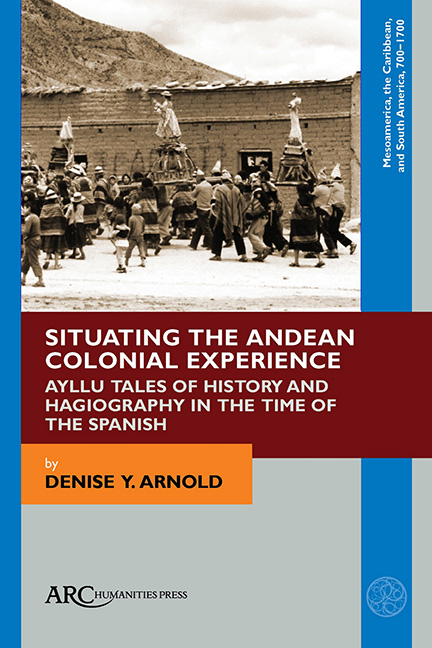 Situating the Andean Colonial Experience
Situating the Andean Colonial Experience Book contents
- Frontmatter
- Contents
- List of Illustrations
- Note About the Spelling of Toponyms and Proper Names
- Acknowledgements
- Maps
- Introduction
- PART ONE THE ORAL HISTORY OF QAQACHAKA
- PART TWO THE COLONIAL CACIQUES IN ORAL AND WRITTEN HISTORY
- PART THREE QAQACHAKA MARKA
- PART FOUR THE SAINTS APPEAR
- PART FIVE THE RELIGIOUS PRACTICES OF QAQACHAKA MARKA
- Some Conclusions
- Glossary
- Appendix A Document C of Don Franco Quispe Maraza
- Appendix B Document K of Don Franco Quispe Maraza
- Bibliography
- Thematic Index
- Index of Toponyms
Chapter 13 - Let’s Sing to the Gods
Published online by Cambridge University Press: 22 June 2021
- Frontmatter
- Contents
- List of Illustrations
- Note About the Spelling of Toponyms and Proper Names
- Acknowledgements
- Maps
- Introduction
- PART ONE THE ORAL HISTORY OF QAQACHAKA
- PART TWO THE COLONIAL CACIQUES IN ORAL AND WRITTEN HISTORY
- PART THREE QAQACHAKA MARKA
- PART FOUR THE SAINTS APPEAR
- PART FIVE THE RELIGIOUS PRACTICES OF QAQACHAKA MARKA
- Some Conclusions
- Glossary
- Appendix A Document C of Don Franco Quispe Maraza
- Appendix B Document K of Don Franco Quispe Maraza
- Bibliography
- Thematic Index
- Index of Toponyms
Summary
Tata Quri, Lord,
Purely Golden Lord …
Doña María Ayca Colque, from the hamlet of K’uytumiriTHE SONGS TO the god-saints, sung mainly by the women of the annex, are in many ways the female counterpart to the men's bellicose “grasping” of these gods in the round of turns. In their songs, the women “wrap up” the god-saints in a layer of sound, so these actions are also the female equivalent of the men's wrapping of the saints, such as Tata Quri, first in a wooden box and then in layers of cloth. We heard in some commentaries that the actual content of the song verses has to do with the idea of marriage with these god-saints, so the songs confirm this custom too.
As a genre these songs are called yusa kirki, “songs to the gods,” or alternatively yusa wirsu, “verses to the gods.” The sponsor couple, man and wife, of the feast to a certain god, perform these songs as part of their obligations in the event, announcing “Let's sing to the gods,” Yusar kirkiñani. The man of the couple has the obligation to sing to the goddess which he celebrates as his “spiritual” wife, whereas the woman sings to the god she celebrates as her “spiritual husband.” Note that only the gods who are assigned their own feast days have songs dedicated to them. The lesser gods who no longer have feasts assigned to them, such as Tata Animasa and Mama Dolores, are no longer honoured with songs.
The songs to the gods are grouped into three classes or categories. The goddesssaints are all considered to be generic “mothers” (tayka) and are honoured with the same sung melody. So Mamita Candelaria (Siñura Kantilayra), the Mamitas Kapitana and Ch’uri (with their shared appellative of Kunsyuna, Conception), and Llama Herding Girl (Qarwiri Imilla) all have the same song dedicated to them, called “Little Lady, Little Dove” (Siñurita Palumita). The only difference between their songs is in the lyrics, which might make reference to the relations of kinship between them, naming the true “mother” in the case of Mama Candelaria, or the sisters of the family “from younger to elder” (kullak jisk’a) in the cases of Kapitana and Ch’uri.
- Type
- Chapter
- Information
- Situating the Andean Colonial ExperienceAyllu Tales of History and Hagiography in the Time of the Spanish, pp. 275 - 294Publisher: Amsterdam University PressPrint publication year: 2021


